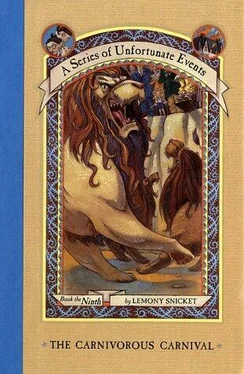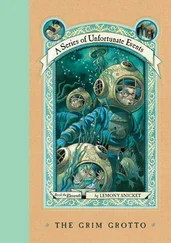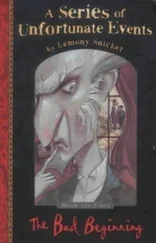Lemony Snicket - The Carnivorous Carnival
Здесь есть возможность читать онлайн «Lemony Snicket - The Carnivorous Carnival» весь текст электронной книги совершенно бесплатно (целиком полную версию без сокращений). В некоторых случаях можно слушать аудио, скачать через торрент в формате fb2 и присутствует краткое содержание. Год выпуска: 2002, Жанр: Прочие приключения, на английском языке. Описание произведения, (предисловие) а так же отзывы посетителей доступны на портале библиотеки ЛибКат.
- Название:The Carnivorous Carnival
- Автор:
- Жанр:
- Год:2002
- ISBN:нет данных
- Рейтинг книги:5 / 5. Голосов: 1
-
Избранное:Добавить в избранное
- Отзывы:
-
Ваша оценка:
- 100
- 1
- 2
- 3
- 4
- 5
The Carnivorous Carnival: краткое содержание, описание и аннотация
Предлагаем к чтению аннотацию, описание, краткое содержание или предисловие (зависит от того, что написал сам автор книги «The Carnivorous Carnival»). Если вы не нашли необходимую информацию о книге — напишите в комментариях, мы постараемся отыскать её.
The Carnivorous Carnival — читать онлайн бесплатно полную книгу (весь текст) целиком
Ниже представлен текст книги, разбитый по страницам. Система сохранения места последней прочитанной страницы, позволяет с удобством читать онлайн бесплатно книгу «The Carnivorous Carnival», без необходимости каждый раз заново искать на чём Вы остановились. Поставьте закладку, и сможете в любой момент перейти на страницу, на которой закончили чтение.
Интервал:
Закладка:
"If our parents are alive?" Klaus interrupted. "Do you know if one of our parents is really alive?"
The middle Baudelaire's voice quivered, and his sisters turned to look at him–a feat that was difficult for Violet, who was still sharing his shirt–and saw that he was crying. Violet leaned so that her head was against his while Sunny put her mug down and crawled closer to hug his knees, and the three Baudelaires stood quietly together for a few moments.
Grief, a type of sadness that most often occurs when you have lost someone you love, is a sneaky thing, because it can disappear for a long time, and then pop back up when you least expect it. When I am able, I go out walking on Briny Beach very early in the morning, which is the best time to find materials important to the Baudelaire case, and the ocean is so peaceful that I feel peaceful, too, as if I am no longer grieving for the woman I love and will never see again. But then, when I am cold and duck into a teashop where the owner is expecting me, I have only to reach for the sugar bowl before my grief returns, and I find myself crying so loudly that other customers ask me if I could possibly lower my sobs. With the Baudelaire orphans, it was as if their grief were a very heavy object that they each took turns carrying so that they would not all be crying at once, but sometimes the object was too heavy for one of them to move without weeping, so Violet and Sunny stood next to Klaus, reminding him that this was something they could all carry together until at last they found a safe place to lay it down.
"I'm sorry I was testy, Klaus," Violet said. "There's just so much we don't know that it's hard to think about all at once."
"Chithvee," Sunny said, which meant "But I can't help thinking about our parents."
"Me neither," Violet admitted. "I keep wondering if one of them survived the fire."
"But if they did," Klaus said, "why would they be hiding in a faraway place? Why aren't they trying to find us?"
"Maybe they are," Violet said quietly. "Maybe they're searching for us everywhere they can think of, but they can't find us, because we've been hiding and disguising ourselves for so long."
"But why doesn't our mother or father contact Mr. Poe?" Klaus said.
"We've tried to contact him," Violet pointed out, "but he doesn't answer our telegrams, and we can't seem to reach him by phone. If one of our parents has survived the fire, maybe they're having the same wretched luck."
"Galfuskin," Sunny pointed out. By "Galfuskin" she meant something like, "This is all guesswork–let's go to the fortune-telling tent and see if we can find out anything for sure, and we'd better do it soon before the others get back."
"You're right, Sunny," Violet said, and put her mug down next to Sunny's. Klaus put down his mug, and all three Baudelaires took disguised steps away from their hot chocolate. Violet and Klaus walked awkwardly in their shared pants, leaning against one another with every step, and Sunny followed alongside, still crawling so that she would look half wolf if anyone watched them as they made their way through the carnival toward the fortune-telling tent. But no one was watching the Baudelaire orphans. The visitors to the carnival had gone home to tell their friends about the lion show happening the next day. The children's coworkers were in the freaks' caravan bemoaning their fate, a word which here means "playing dominoes, rather than trying to think of a way out of their predicament." Madame Lulu and Olaf's assistants were digging the pit, over by the roller coaster still covered in ivy. Count Olaf and Esmé Squalor were bickering in the guest caravan, which was located at the far end of the carnival where I had stayed with my brother so many years ago, and the rest of Madame Lulu's employees were closing down the carnival and hoping that someday they might work in a less miserable place. So nobody was watching as the children approached the tent next to Lulu's caravan, and stopped for a minute at the flap that led inside. The fortune-telling tent no longer stands at Caligari Carnival, or anywhere else for that matter. Anyone wandering through the blackened and desolate hinterlands would scarcely be able to tell that there had been any tents at all. But even if everything looked exactly the same as when the Baudelaire orphans stayed there, it is unlikely that a traveler would understand what the tent's decoration meant, as nowadays there are so few living experts on such subjects, and the experts who are alive are all in terrible circumstances, or, in my case, on their way to terrible circumstances in the hopes of making them less terrible. But the Baudelaire orphans– who, as you will recall, had only arrived at the carnival the night before, and so had never seen the fortune-telling tent in daylight until this very moment–could see how the tent was decorated, which is why they stopped to stare at it. At first glance, the painting on the fortune-telling tent seemed to depict an eye, like the decoration on Madame Lulu's caravan and the tattoo on Count Olaf's ankle. The three children had seen similar eyes wherever they went, from a building in the shape of an eye when they were working in a lumbermill, to an eye on Esmé Squalor's purse when they were hiding in a hospital, to a huge swarm of eyes that surrounded them in their most frightening nightmares, and although the siblings never understood quite what these eyes meant, they were so weary of gazing at them that they would never pause to look at one again. But there are many things in life that become different if you take a long look at them, and as the children paused in front of the fortune-telling tent, the painting seemed to change before their very eyes, until it did not seem like a painting at all, but an insignia.
An insignia is sort of a mark that usually stands for an organization or a business, and the mark can be of any sort whatsoever. Sometimes an insignia can be a simple shape, such as a wavy line to indicate an organization concerned with rivers or oceans, or a square to indicate an organization concerned with geometry or sugar cubes. Sometimes an insignia can be a small picture of something, such as a torch, to indicate an organization that is flammable, or the three-eyed girl outside the House of Freaks, indicating that people who were unusual in some way were on display inside. And sometimes an insignia can be part of the name of the organization, such as the first few letters, or its initials. The Baudelaires, of course, were not involved in any sort of business, aside from disguising themselves as carnival freaks, and as far as they knew they were not members of an organization of any kind, and they had never even been to the hinterlands until Count Olaf's car had taken them down Rarely Ridden Road, but the three children took a long look at the insignia on Madame Lulu's tent, because they knew that it was important to them somehow, as if whoever had painted the insignia knew they would come here, and wanted to bring them inside.
"Do you think . . ." Klaus said, his voice trailing off as he squinted at the tent.
"I didn't see it at first glance," Violet said, "but as I took a long look . . ."
"Volu . . ." Sunny said, and without another word the three children peered into the entrance, and, seeing no sign of anyone inside, took a few steps forward. If someone had been watching the youngsters, they would have seen these few hesitant steps as they entered the fortune-teller's tent as quietly as they could. But there was no one watching. There was no one to see the flap of cloth as it closed quietly behind them, making the whole tent shiver ever so slightly, and there was no one to notice that the painting shivered, too. There was no one watching the Baudelaire orphans as they drew closer to finding the answers to their questions, or solving the mysteries of their lives. There was no one to take a long look at the painting on the tent to see that it was not an image of an eye, as it appeared to be at first glance, but an insignia, standing for an organization the children knew only as V.F.D.
Читать дальшеИнтервал:
Закладка:
Похожие книги на «The Carnivorous Carnival»
Представляем Вашему вниманию похожие книги на «The Carnivorous Carnival» списком для выбора. Мы отобрали схожую по названию и смыслу литературу в надежде предоставить читателям больше вариантов отыскать новые, интересные, ещё непрочитанные произведения.
Обсуждение, отзывы о книге «The Carnivorous Carnival» и просто собственные мнения читателей. Оставьте ваши комментарии, напишите, что Вы думаете о произведении, его смысле или главных героях. Укажите что конкретно понравилось, а что нет, и почему Вы так считаете.












